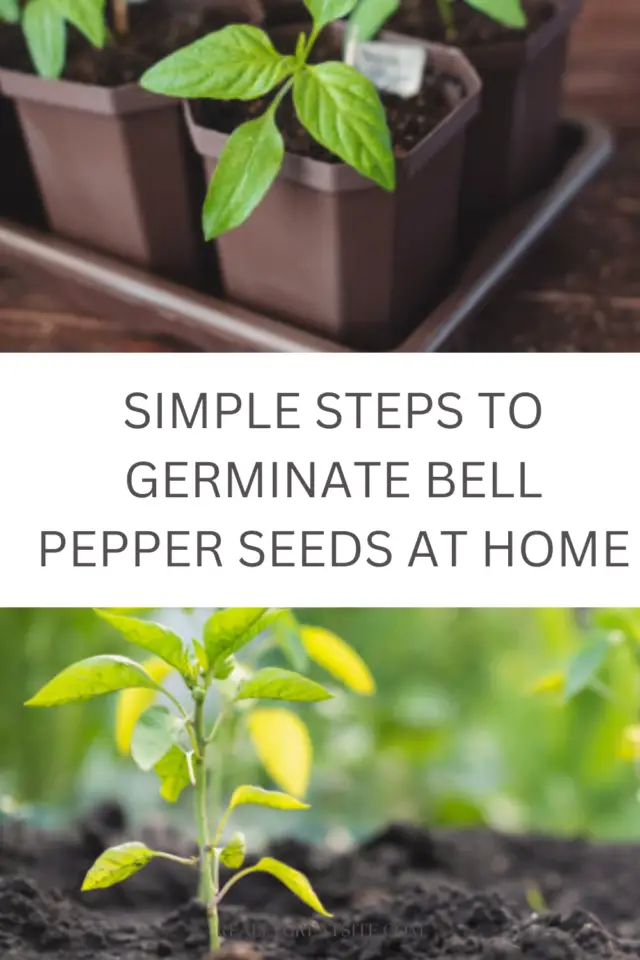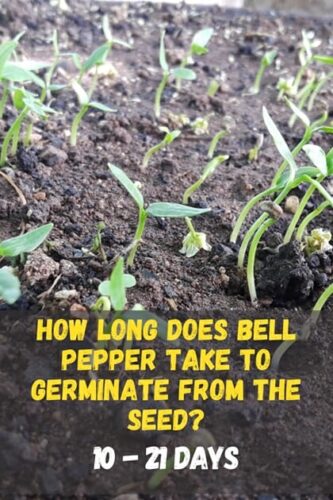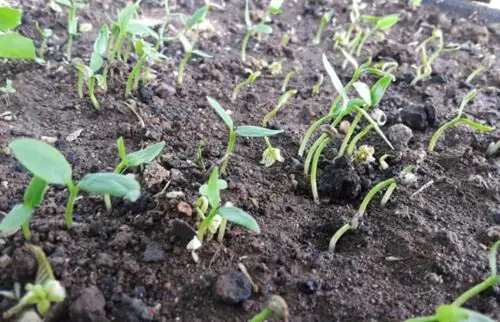How Long Do Bell Pepper Seeds Take to Germinate?
The time it takes a bell pepper to start its germination process is approximately 10–21 days.
Bell pepper seedlings take a while to sprout, unlike other variations of peppers.
They can also take at least 14 days or more to germinate, depending on the variety, nursing conditions, and soil type.
If 14–21 days have passed and there is no sign of germination yet, then there is a good chance that the bell pepper seed is spoiled.

A lot of people sometimes use the seed from the bell pepper they store-bought at the supermarket.
Most of those seeds are already dead and will not germinate most of the time.
It is ideal to get bell pepper seeds from the source itself before they are processed, or better yet, from the nearest nursery or farm store.
A well-ripened bell pepper vegetable seed that is freshly picked is ideal for regrowing. This, however, is if they are mature enough.

How Long Does Bell Pepper Seeds Take To Germinate?
What Is the Most Successful Method of Germinating Bell Pepper Seeds?
The most effective method to successfully germinate bell pepper seeds is to stick them in some damp potting soil, about 1/4 inch deep.
Afterward, firm the soil lightly, then put them in a warm location, on top of your refrigerator.
Why?
Well, it’s because they germinate better at 75–80 degrees Fahrenheit. Also, make sure the soil stays evenly moist, not wet, during the process.
Once the bell pepper seeds start to germinate, put them on a sunny window sill or under grow lights.
During their germination process, let them dry out almost completely before watering them each time, and one more thing: never, ever let them sit in soggy soil.
Once your bell peppers reach about 4” inches tall, plant them outside in the garden or in a large pot with potting soil.
Remember, let the sprouting bell pepper plant dry out almost completely between waterings.
Give them a little fertilizer that’s higher in phosphorous than nitrogen.
This will most definitely encourage flower and fruit production with the bell pepper plant.
When to Transplant Bell Pepper Seedlings?
The ideal time to transplant bell pepper seedlings is after they reach 4–5 inches tall or high and the soil is warm consistently every day. Carefully plant the peppers into your soil.
It is also best to transplant the bell pepper seedlings in the late afternoon.
Water well, and you can place the baggie like a tent over the plant if your garden soil isn’t warm enough.
Furthermore, I usually start seeds in late February each year; that way, I know how many seeds are going to germinate.
I find this method much more successful and better than direct sowing in the garden soil.
What is germination, and how does it work?
Germination is when a plant seed or fungal spore wakes up and sprouts upward. The plant seed interior contains the essentials of a new plant:
A radicle, which is an embryonic root, is the first thing to emerge from the seed when it germinates.
Then, in a plumule, the first embryonic leaves of the plant sprout upward.
And also, the cotyledons are a store of food for the new plant to keep it going until there is a root to access water and leaves above the soil to access the sun.
Germination with any plant seed is complete when the first leaves have opened fully above the soil or when the fungal spore begins growing.
Nevertheless, the most important thing that all seeds need to germinate is water.
Seeds can be dormant and stored for years in dry conditions; water makes them wake up once they are submerged.
The Right Temperature To Germinate Bell Pepper Seeds
Temperature plays a major role. Sometimes, plants from temperate climates require their seeds to go through a cold period in order to germinate successfully.
Nevertheless, warmth is generally a good thing for seed germination. Seeds won’t germinate in freezing conditions, whatever they are.
How Far in the Soil Should You Sow Bell Pepper Seeds?
The depth of the seeds can be a factor in how they germinate. 1/2 inch in the soil should be a great depth for bell pepper germination.
Some seeds are able to germinate directly on the surface of the soil, while others need to be sheltered under a good layer of soil.
A fungal spore plant will germinate whenever it lands in conditions appropriate for that particular plant species.
Usually, this means that warm temperatures, high moisture, and appropriate material grow on food.
For example, most of the mushroom plants we eat as food naturally grow on rotting wood material.
Is it necessary to germinate seeds before planting them?
Depending on where you live and the weather, it might be a good idea to germinate bell pepper seeds before planting.
If some seeds take longer than others to come up or sprout, like bell peppers, it’s not a big deal for some people if they come up late.
However, if you want to make sure that the ones you really want germinate, then, by all means, germinating your seeds is the way to go.
Should you germinate bell pepper seeds before planting them?
Some plant seeds should only be planted directly in the ground when the soil temperature is right, such as Punkins, okra, Melons, etc. Basically, any plant does not like when its root gets disturbed.
Large plant seeds, such as Cabbages, bell peppers, and Sweet Corn are good examples of plants that are ideal to germinate before planning.
Other plants, such as tomatoes, do better if they are started inside and transplanted later.
I always buy small tomato and pepper plants and transplant them at the appropriate time, and I always get the best results from them each time.
It is also important to know that some seeds need periods of cold before they will sprout.
While others need to have their seed coats scratched so that water can penetrate the seed coat before germinations begin,.
Thank you for stopping by, This was a quick post based on my experience on ‘How Long Does Bell Pepper Seeds Take To Germinate?’
I hope it has been helpful to you. Keep gardening.
Related: How Long Beans Take To Germinate




